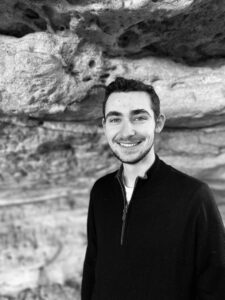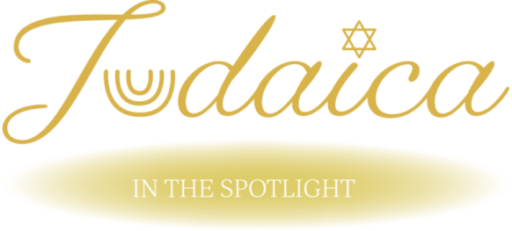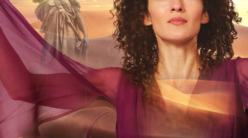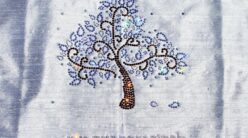
Photo: Courtesy of Aryeh Naar
Tell us a little bit about yourself and your background.
My name is Aryeh Naar. I am 19 years old from Sydney, Australia. From a very young age I’ve been singing and involved with music. From when I was three years old, I remember standing on the Bimah next to the Chazan, Cantor, at my synagogue. My grandfather was the Rabbi so I had a connection to the synagogue and remember singing Anim Zemirot and Adon Olam every Shabbat at the end of the service. I began playing violin when I was five, followed by piano and now a little bit of guitar too. My family as a whole is musical and involved with instruments or being a Chazan in their local Shule for Shabbat or Rosh Hashana and Yom Kippur.
What inspired you to become a musician?
I don’t know if anything particularly inspired me, or more that I fell in love with music. Now I cannot imagine a day where I won’t sing along to a song, sit down at the piano and just play. I’ve always been surrounded by instruments and music and it became embedded in me and really became a passion.
Where do you take your inspiration from when composing?
When I am composing my music I always have in mind that I am creating the composition order for me to sing with it. The compositions, music, I write are all pieces that I want to share with people and that I connect to. There are a number of artists, Jewish and non-Jewish, who I listen to. I hear how they sing, what techniques they use to use their voice in particular ways. Being a Chazan myself, I have fellow Chazzanim, cantors, who I speak to, who give me advice and help me learn and know how to bring out the emotion in the piece or how to reach a specific note. Alongside the singing comes the composing.
The music that I create comes from what I hear when I imagine the song. For example, with my latest release, Hamalach Hagoel, a calm song which is usually sung to children at night. When I was composing the music for that song, I imagined the type of tune and emotion I want to bring out from the music and which instruments would evoke and arouse that emotion. It’s a balance between the emotion of the voice and the emotion brought by the instruments. It’s a difficult balance. The voice, the person singing, tells their story and presents their connection to the song and music. The instruments bring their own connection and story. Everything needs to harmonise and come together as one.
Do you believe a classical training is essential to be successful?
I do not believe that classical training is required in order to sing. For those that are becoming a Chazan at their Shule, classical training can definitely help. Chazzanut, the music sung for generations by the Chazzanim all over Europe and Israel and now in almost every Shule around the world, is definitely more comparable to classical music. It can be similar to opera. It can be similar to the classical era. If you look back at the Chazzanim from even 50, 100 years ago – Yossele Rosenblatt, Leib Glantz, Moishe Oysher, just to name a few, they sing with a voice unfamiliar in the modern day. Today, with pop music, rap, hip hop, we lose the classical nature of music. Music has become more simple. For the last 60 years, pop music has been using the same four chords, every song is almost identical at its base level. If you look before that, music was a story, it was different, unique. The cantorial music is the same. These incredible Chazzanim kept that type of voice and singing and brought it into prayer to bring depth and huge amounts of emotion. Classical training is not required to sing, but to be a Chazan, it is a massive asset that one can most definitely use. For those that are singing more modern music, the technique and type of singing used to sing classical pieces is out of touch with the modern music of today.
What is your favourite piece of music and why?
This is a difficult question for me. I find it near impossible to pick one song which is my favourite. Every song has its own meaning, the lyrics, every artist and singer has his or her own story they bring to the song. Besides all that, every artist sings the same song differently and can change the entire dynamic of a piece. So, I don’t know if I necessarily have a favourite. I enjoy the instrumental part of a piece and how it was written, what it’s saying, how the instruments have been brought together to make a masterpiece. The voice is its own entity, which I take all different lessons and things from. The type of music that I find the most interesting and most exciting to listen to is most definitely orchestral music. It has such depth and value. So many individual instruments have been made into one entity and it’s really quite exciting. For the right piece, an artist singing above the instruments adds another dimension and makes it even more incredible. An example of a piece I am very fond of is ‘When You Believe’ from Les Misérables. Shulem Lemmer, a particular favourite of mine, sings his version of this song and it is magnificent.
How much do you practice in an average week?
I don’t know how much I sing in a week. When I am the Chazan, I have my time on Shabbat to sing and even experiment while leading the congregation. Before Rosh Hashana and Yom Kippur I take a little bit of extra time in the days before to prepare. Practice the pieces I plan to sing during the services. I have those times where I spend a bit extra making sure I’m ready. Other than that, I generally just sing when I am at home, when I am recording my music. The voice isn’t something you can really just forget. Of course practice can bring another dimension to your voice and to your technique but it becomes a lot of muscle memory and stays with you. You need to maintain your voice and keep it healthy, but that’s generally done just by singing regularly. The times I really practice are when I am planning on singing a piece that I haven’t done before or a piece that is difficult, uses technique I am unfamiliar with or even can just be a song which has a high note and I’m worried that I may struggle to hit the note on the day so I practice before to just encourage myself.
What are you currently working on?
I have a couple of songs that are b’ezrat Hashem being released over the next month or so. My first release, Hamalach Hagoel, was released mid-July. I have my cover of Can’t Help Falling In Love, a classic song, which is coming out on August 16th. Soon after that, I hope that my version of Ochila La-Kel, from the Rosh Hashana and Yom Kippur services, will be released. I have another song, Im Eshkachech, a famous piece, which I have sung with a friend of mine from Israel, and will hopefully be released before Rosh Hashana or possibly soon after. I am constantly working on songs and writing the music, recording the vocals. As I mentioned at the beginning, music is a part of me and a passion. I need to keep writing and making music. Every day it can be a different song, over a couple weeks I can record a few different songs. Getting the songs out to the world, on Spotify, Apple Music, that takes a little bit of time. One other song I forgot to mention – I will also hopefully be having my first original song being released this year that I am writing with a friend of mine from America, keep on the lookout for when it is released.
Which musician would you like to collaborate with next?
I don’t know who I would like to collaborate with next but I can tell you that if I could one day in the future be able to collaborate with Shulem Lemmer, that would be a privilege. He’s one of the latest Jewish artists to break out into the music scene and world, and he’s a wonderful musician and person. I’d say he is someone I would one day like to collaborate with.
What advice would you give to an aspiring musician?
My advice to an aspiring musician is quite simple. Music is a passion, something you love, something you feel. If you’re a singer, then sing. Sing all the time. In the shower, at home. Get used to singing around family and friends. It’s difficult and awkward, embarrassing but it can only help you. Find songs you like, sing them. You’ll see yourself grow and you’ll surprise yourself.
Singing lessons are always helpful and are usually a safe path to follow when starting out. You don’t want to damage your voice. For a musician, my advice is similar. Play the instrument, practice. It doesn’t need to be classical pieces or anything special. Sit down, or stand, and just play. Find sheet music online. Listen to songs on YouTube and if you can, try and copy them. For everyone, one thing that I think is definitely useful is learning music theory. It is so easy to find lessons on YouTube. Learning the theory of music, how chords interact with each other, how notes interact – it all really helps grow one’s understanding of their instrument or voice. For a singer, I think it really helps in knowing how to harmonise, how to find harmonies and tunes that go well with others. It’s an invaluable bit of information.
How can our readers book you and where can they download your music?
I have a few places where you can find me and my music.
@aryehnaarmusic is my name on Twitter, Instagram and Facebook
Aryeh Naar is the name my music is under on Spotify, Apple Music and a number of other music streaming stores around the world.
iTunes and Amazon also sell my music for those wanting to buy.
Here are the links to my social media and music. I hope you enjoy it!





